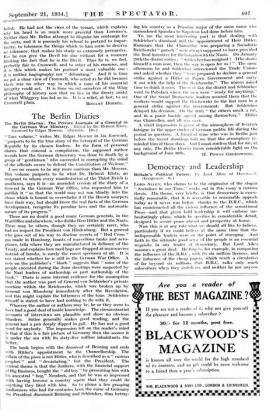The Lord Prothctor
Cromwell. By Hilaire Belloc., (Cassell. 12s. 6d.)
IN the House of Commons there is a bust of Cromwell, probably by Bemini, of which Mr.. Belloc gives us a photograph as
frontispiece. It was cleverly chosen, for it reveals above all things the man of action who will not shrink from rivers of blood ; the lower part of the face is surprisingly like that of Lorenzo de Medici as seen in his death-mask. There is nothing in Bernini's work of the " saint," of the man who for so many years suffered profoundly from melancholia, or who writhed and groaned at public wrestlings with the Lord. For it is as a soldier that Mr. Belloc—as always romantically in love with soldiering—admires Cromwell, as a cavalry leader of abso- lutely first rank, and a tactician of genius. Not a strategist, for even in the little strategy there was in the Civil and Scottish wars, Cromwell did not shine : strategically Dunbar was a disaster, Worcester a great tactical success only, the moves leading up to it too obvious. Yet Mr. Belloc does not stint his admiration for the great captain who formed and informed the New Model Army.
There is another respect in which he admires Cromwell ; as a clear-headed and immensely skilful political intriguer. He is full of praise for the way in which Cromwell, keeping himself in the background, compassed the death of the King : a clear necessity. Either the King's head or Cromwell's had to fall, and Cromwell naturally preferred it should be the King's. Mr. Belloc has no doubt but that Cromwell's hand can be seen in all that happened to Charles after the Scots surrendered him to Parliament : his capture by the army, his " escape from Hampton Court (he makes out an almost unanswerable case for this), his bringing to trial with its inevitable conclusion. No need to blame Cromwell for this, any more than there is need to blame him for any of the lies and subterfuges insepara- ble from any affairs of State, any more than there is need to blame Charles for his intriguing to the end : it was his business to play off the Scots, Parliament, and the army against each other, if he could.
Indeed it is not Mr. Belloc's business to blame Cromwell for anything ; he is intent upon analysing his character, and upon destroying the two opposing myths, of Cromwell the Monster, and Cromwell the God-inspired Hero. The book is extremely well written, as good as anything Mr. Belloc has done, which is to say that it is very good, and is written in a style which manages to be decisive without being didactic. His manner does not admit of your arguing against him : he is telling you ; but he is never for a- moment schoolmastery. " Style," as T. E. Hulme said, " is a method of subduing the reader " : Mr. Belloc subdues us, but we do not feel we are in thrall : it is merely that we tread with absolute confidence in the road he maps out for us.
Cromwell, besides being what he was in himself, represented two very important, indeed dominant elements of the seven- teenth century in England : the millionaire aristocracy brought into being by the dissolution of the monasteries, and the Calvinistic spirit which hated and feared the old religion, and lived under the shadow of " the menace of Rome." As Mr. Belloc says, it was the latter which pre- dominated in the East Anglian potentate, who indeed (like Lorenzo) had no great skill in money matters, and might per- haps have recoiled from the whole business could he have foreseen what the final result would be, the conquest of monarchy by the money power. Cromwell, in fact, was careless of economic interests (till, as Protector, they got their thumb on him) : but " the Catholic menace" drove him frantic, whence the orgy of blood at Basing House, the ghastly shambles at Drogheda and Wexford, all in such' marked distinction to the humanity which otherwise char- acterized these wars. Mr. Belloc devotes an extremely interesting chapter to showing how real the Catholic menace was to the Protestants of those days : hatred of the Evil Thing turned Cromwell into a blood-lusting demon.
Mr. Belloc is scrupulously fair to Oliver, but he does not pretend to like him, and there is no reason why he should- All dictators are nasty. Yet he clears Cromwell of the charge of ambition. As a soldier he did what he did because nobody else could : he had to get rid of Manchester whether he was a Montagu . or_ not : when he found himself Protector, he did all that was possible to share the responsibility, and failed. He had not the vices of the tyrant, which explains why his head is so much more graceful than Lorenzo's. Neither does Mr. Belloc attempt to disguise his contempt for the sects, and. it is precisely his refusal to pretend to impar- tiality, to tolerance for things which to him seem to deserve no tolerance, that makes his study so extremely persuasive. For he- can give the Devil his due without for a moment blinking the fact that he is the Devil. Thus he is, we feel, perfectly fair to Cromwell, and to other of his enemies, and it is this which makes his portrait a most. valuable one : it is neither hagiography. nor debunking." And it is time we got a clear view of Cromwell, who acted as he did because there was no other way in which a man of his essential integrity could act. It is time we rid ourselves of the Whig philosophy of history now that we live in the dreary midst of what Whiggery has led us to. It is a relief, at last, to see







































 Previous page
Previous page